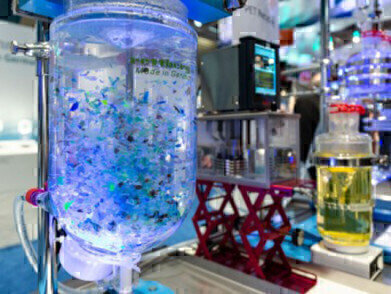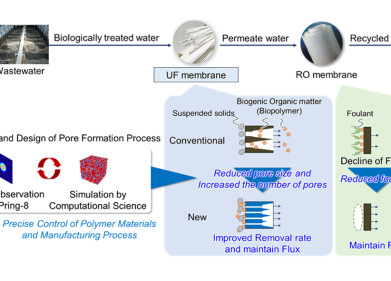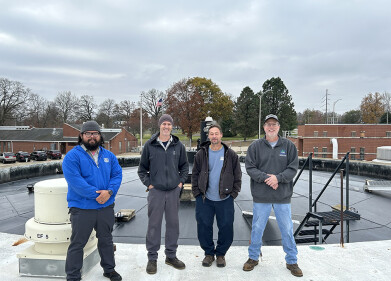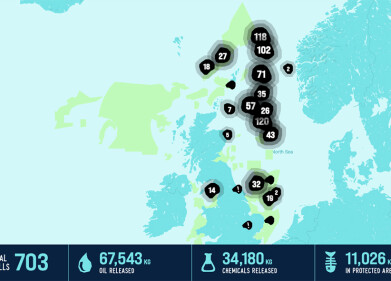Water/Wastewater
Ensuring the availability of clean water
Mar 06 2020
Modern water and sewage technologies will be among the central exhibition contents at IFAT 2020. In addition to the “traditional” services of treatment, distribution and cleaning, there are other challenges that the industry must solve—from dry periods and trace substances to threats to the IT infrastructure.
Sufficient amounts of clean water are a valuable social commodity that is to be secured and protected. And even countries rich in water and with high infrastructural and environmental technology standards such as Germany face many challenges to be mastered—including residues of pharmaceuticals, plant protection agents, biocides and other chemicals in the water cycle. These can have adverse effects on the environment and human health—even in very low concentrations, as micropollutants.
Technical processing involves costs—also starting at source
In technical terms, it is possible to remove some of these anthropogenic trace substances in wastewater treatment plants, for example by ozonation or activated carbon adsorption. This, however, requires existing purification stages to be modified or the addition of further purification steps. “These measures require investments and involve high energy, material and personnel costs, which have an impact on the sewage charges of those citizens who are connected to such extended wastewater treatment plants”, emphasizes Prof. Dr. Uli Paetzel. The President of the German Association for Water, Wastewater and Waste (DWA) continues: “The nationwide and water-independent introduction of such a fourth purification stage as an end-of-pipe solution is not appropriate and is not supported by us.” Water resources must be such that drinking water can be obtained from them using simple, near-natural treatment processes. “Precautionary measures aimed at ensuring that micropollutants do not enter the water cycle at all, but are contained at the source are of central importance for the safety of drinking water supplies,” explains Prof. Dr. Gerald Linke, Chairman of the Board of the German Technical and Scientific Association for Gas and Water (DVGW).
Here, the Federal Environment Ministry gets involved as well, intending to develop a strategy for trace substances in a stakeholder dialog. For selected micropollutants that are considered relevant—such as X-ray contrast media—resource-directed reduction measures are developed. The manufacturers of the products that cause the trace substances are responsible for the round tables that develop these measures.
Battle against microplastics
Undesirable substances in waters include plastic particles, which are introduced in different ways. According to DWA data, today, sewage treatment plants generally eliminate more than 95 percent of the microplastic load entering the plant—but they do not eliminate it completely. Consequently, the release into the waters must ideally be avoided at source. For example, the environmental technology market recently introduced a filter system that retains microplastics from the drain of artificial turf pitches. These sports areas, which are spread all over the world, are considered an important source of microplastics: a modern artificial turf pitch releases 250 to 300 kg every year. With the new system, the particles accumulate on the filter surface as a filter cake, which—according to the company—is peeled off and disposed of every three to five years, refilling the filter substrate removed in this process.
Reliable water supply despite dry periods
In Germany, the overall sufficient supply of water is distributed unevenly among the regions. According to the Federal Environment Agency there is no water stress in Germany so far, but the dry and hot summers of 2018 and 2019 have already resulted in some local bottlenecks. “If the climate forecasts that predict varying degrees of decline in water availability in almost all parts of Germany over the coming decades are correct, politics, agriculture, industry and society will have to join forces to secure the public water supply,” stresses DVGW Chairman Linke. Together with the utilities and politicians, his association develops concrete initiatives for a reliable water supply despite climate change. This includes a stronger networking of suppliers as well as ensuring that drinking water supply takes priority over other water uses.
Another approach is to use the extracted water as efficiently as possible. Here, cooling and industrial water of power plants and industrial companies is an important playing field for technological innovations. To protect surface waters and groundwater, the recycling of industrial water—which has long been practiced in southern European agriculture—is now also being discussed for Germany.
Implementing an IT security standard
Drinking water supply and sewage disposal are part of the so-called critical infrastructure, meaning that they are subject to special requirements for IT security. Eventually, a disruption, impairment or even failure due to a cyber-attack or an IT security incident can lead to significant supply bottlenecks, disruptions to public safety and other dramatic consequences. Hence—in close cooperation with the Federal Office for Information Security (BSI) and the Federal Office for Civil Protection and Disaster Relief (BBK)—the DWA and DVGW developed an IT security standard for the water industry. In August 2017, the BSI officially recognized this standard. “In addition to implementing risk management measures, plant operators have since invested heavily in making their IT infrastructure more robust against IT attacks. Not only the software but also the hardware was improved, for example, the process control was renewed, and IT networks reorganized,” reports DWA President Paetzel.
Events
Mar 18 2025 Expo Santa Fe, Mexico
Mar 18 2025 Moscow, Russia
Mar 19 2025 Manila, Philippines
Mar 20 2025 Guangzhou, China
Mar 24 2025 National Harbour, MD, USA














